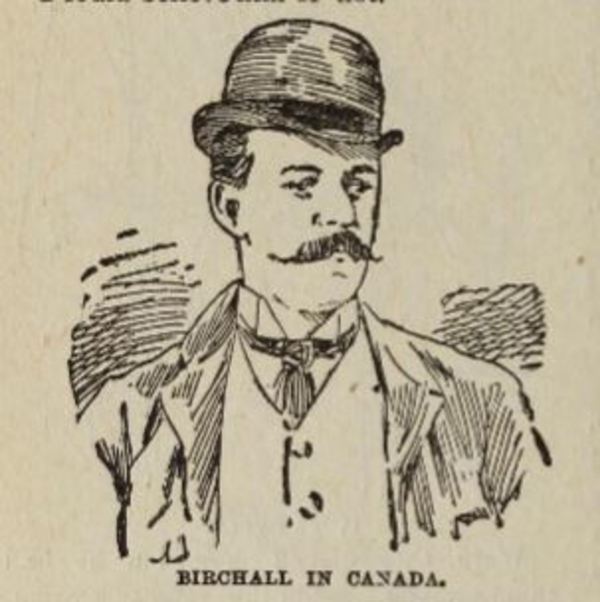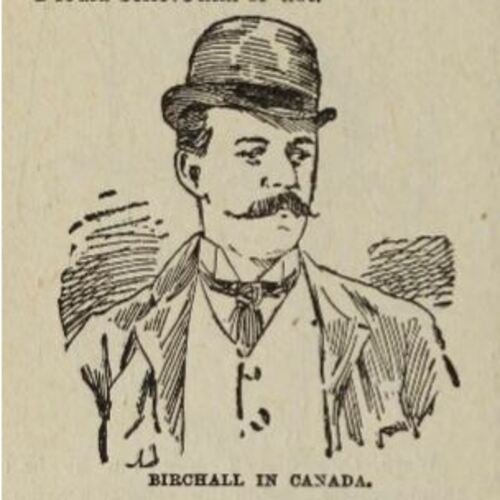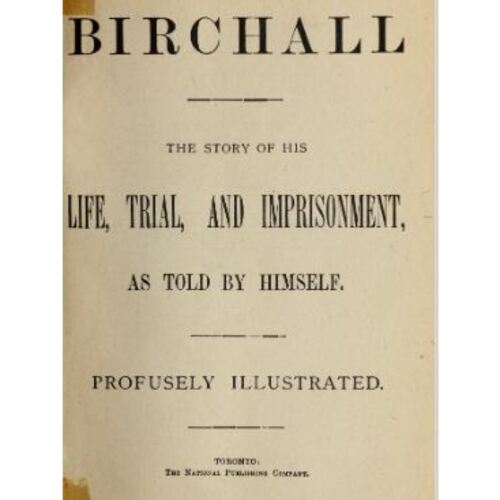
Source: Link
BIRCHALL, REGINALD (also known as Lord Frederick A. Somerset), convicted murderer; b. 25 May 1866 at Accrington, Lancashire, England, youngest son of the Reverend Joseph Birchall; m. in 1888 Florence Stevenson; d. 14 Nov. 1890 in Woodstock, Ont.
Reginald Birchall, after two years of private tutoring, spent six years in public schools, during which time he found delight in “whatsoever was against the rules and whatsoever was redolent of lawlessness and disorder.” In the early spring of 1885 he entered Lincoln College at Oxford. Birchall had inherited £4,000 in 1878 from his father’s estate to be held in trust until his 25th birthday. Nevertheless, he proceeded to live like a young aristocrat and through licentious activity, highlighted by his founding of the hedonistic Black and Tan Club at Oxford, fell heavily into debt. By 1888 he was forced to sell his future inheritance, at the discounted value of £3,000, to appease creditors and left Oxford without obtaining a degree. Birchall invested £500 in a farm at Woodstock, Ont., and eloped with the daughter of David Stevenson, master of transportation of the London and Northwestern Railroad. In November 1888 they set sail for Canada.
In Woodstock they found not the prosperous estate that had been advertised but a small farm. Undaunted, they took rooms in Woodstock, and, calling themselves Lord and Lady Somerset, established a line of credit and took the social life of the community by storm. Six months later, pressed by the local merchants to pay their bills, Lord and Lady Somerset suddenly disappeared from Woodstock and returned to London.
Birchall received an insider’s tip on a sure thing in the 1890 English Derby. To raise capital he placed an advertisement in London newspapers posing as the owner of a prosperous Canadian horse farm and sales-yard who was looking for a partner to buy into the business for £500. Birchall planned to bet the money on the English Derby, take his partner to Canada, stall until the race was run, and then pay back the £500 with interest out of his winnings. Douglas Raymond Pelly invested £170 with Birchall. Separately, Frederick Cornwallis Benwell and his father Colonel F. Benwell of Cheltenham agreed to supply £500 but only after the son had seen the farm and examined the books.
Reginald and Florence Birchall, Pelly, and Benwell arrived in New York City on 14 Feb. 1890 and went on to Buffalo by train, arriving on the 16th. Early the next day Birchall and Benwell travelled by train to Eastwood, a station just east of Woodstock where Benwell expected to be shown the sales-yard. Instead, Birchall evidently led him into a heavily wooded area called Blenheim Swamp and shot him twice in the back of the head. That evening Birchall returned to Buffalo and told Pelly that Benwell had been unhappy with the farm and planned to return to England. Birchall avoided further questioning and the next day the party moved to the Canadian side of Niagara Falls.
On 20 February Birchall wrote Colonel Benwell that his son had examined the business, was well pleased, and had signed a deed of partnership. He requested that Colonel Benwell forward the £500 as soon as possible. Unfortunately for Birchall, Benwell’s body was found in Blenheim Swamp four days after the murder. After Pelly noticed a picture of the victim in a newspaper, Birchall, accompanied by his wife, travelled to Princeton, Ont., and calmly identified the body. But, based on information supplied by Pelly and the suspicion of John Wilson Murray*, chief detective for the province of Ontario, Birchall was arrested at Niagara Falls on 2 March by the local police and was transferred to the Woodstock jail.
His trial opened on 22 Sept. 1890 and excited international attention. Since both Benwall and Birchall were members of the English upper class, there was speculation that the murder was part of a larger scheme to swindle and murder young Englishmen from prosperous families. Cable connections led directly from the court-house in Woodstock to London, England, and newspapers in France, Germany, and Italy covered the trial. Birchall steadfastly insisted that he was innocent but did not address the court. He was defended by George Tate Blackstock* and prosecuted by Britton Bath Osler* with Judge Hugh MacMahon presiding. The circumstantial evidence was overwhelming; Birchall was found guilty and sentenced to hang. On 14 Nov. 1890, in the Woodstock jailyard, Birchall “went to his death ghastly white, but without a tremor.”
During his imprisonment Reginald Birchall wrote Birchall, the story of his life, trial and imprisonment as told by himself (Toronto, 1890).
[J. W. Murray], Memoirs of a great detective, incidents in the life of John Wilson Murray, comp. Victor Speer (Toronto, 1905). Evening Sentinel-Review (Woodstock, Ont.), September–November 1890. W. S. Wallace, Murders and mysteries, a Canadian series (Toronto, 1931), 172–93.
Cite This Article
James W. Nichol, “BIRCHALL, REGINALD (Lord Frederick A. Somerset),” in Dictionary of Canadian Biography, vol. 11, University of Toronto/Université Laval, 2003–, accessed December 31, 2025, https://www.biographi.ca/en/bio/birchall_reginald_11E.html.
The citation above shows the format for footnotes and endnotes according to the Chicago manual of style (16th edition). Information to be used in other citation formats:
| Permalink: | https://www.biographi.ca/en/bio/birchall_reginald_11E.html |
| Author of Article: | James W. Nichol |
| Title of Article: | BIRCHALL, REGINALD (Lord Frederick A. Somerset) |
| Publication Name: | Dictionary of Canadian Biography, vol. 11 |
| Publisher: | University of Toronto/Université Laval |
| Year of publication: | 1982 |
| Year of revision: | 1982 |
| Access Date: | December 31, 2025 |





